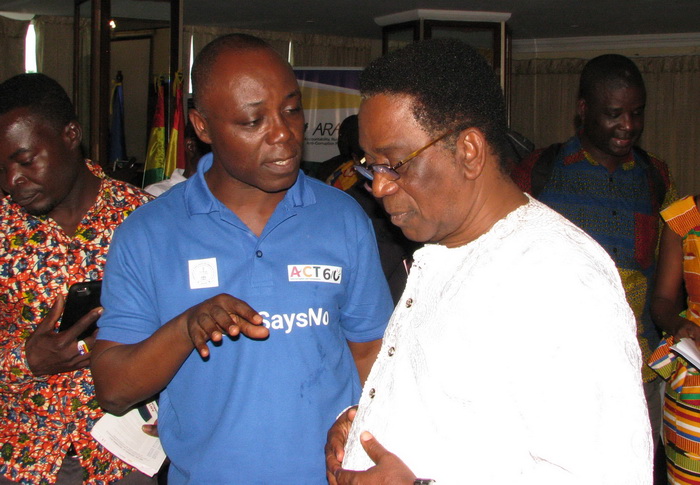
Stop protocol recruitment into public institutions – Anti-corruption crusaders tell Presidency
The National Anti-Corruption and Transparency Week ended in Accra last Saturday, with a call on the Office of the President to stop protocol recruitments into public institutions.
Participants in the week-long celebration, who were drawn from key state agencies, civil society organisations (CSOs) and other non-state actors, said protocol recruitments created an opportunity for corruption to flourish and also deprived vulnerable groups access to public resources.
Among other recommendations, the participants also called on the Presidency to give the needed support to ensure the effective implementation of the National Anti-Corruption Action Plan (NACAP), since that would give purpose to the fight against the canker.
Read also: Footballer, 23, stabs Old Vandal to death
Corruption survey
The call came at a time when the latest Afrobarometer report by the Centre for Democratic Development (CDD) had revealed that 78 per cent of Ghanaians believed that the President and the staff of the Presidency were corrupt.
The survey, which was conducted between September 9 and 25, this year, also ranked the police, judges and magistrates and government officials at the national level as the three most corrupt public institutions, with 92, 88 and 86 per cent, respectively.
Chiefs topped the league table of corrupt private institutions with 80 per cent; business executives, 78 per cent; while the private media and religious leaders were tied on 77 per cent.
Non-governmental organisations (NGOs) followed with 68 per cent.
Show commitment
Presenting the recommendations made at a technical discussion during a national conference by the anti-corruption crusaders as part of the week-long celebration, the Deputy Commissioner of the Commission on Human Rights and Administrative Justice (CHRAJ), Mr Richard Quayson, said the fight against corruption could be won if the Executive arm of government demonstrated enough commitment to perform its role under the NACAP.
"As anti-corruption crusaders, we are impressed about the President's posture on the fight against corruption, but from discussions of the canker so far, it is clear that much has not been done to stop it and so the people want to see more action than talk," he stressed.
He stressed that even though there were more institutions and legal regimes to fight corruption in the country, the canker persisted because the institutions lacked the capacity to lead the fight.
Weak reporting
For instance, he disclosed that the Bureau of National investigations (BNI), CHRAJ and the Economic and Organised Crime Office (EOCO) were only able to investigate 300 corruption-related cases in 2016, out of countless corruption allegations.
To ensure effective reporting and combating of corruption, he called on the Executive and the Legislature to speed up the passage of the Right to Information (RTI) Bill into law to make it easier for people to blow the whistle on corrupt tendencies.
"The RTI Bill, as of now, can be described as the oldest man among the bills in Parliament and so it is about time the appropriate authorities retired it, so that information can be accessed to enhance the fight against corruption," he stressed.
Expedite action
The Vice-President, Dr Mahamudu Bawumia, in his contribution, urged the Attorney-General to expedite action on anti-corruption bills for parliamentary approval to strengthen the legal regime for the fight against corruption.
In a speech read on his behalf by the Minister of State in charge of Tertiary Education, Professor Kwesi Yankah, Dr Bawumia also urged the inter-ministerial committee for the implementation of the Sustainable Development Goals (SDGs) to collaborate with CHRAJ to weed out corrupt practices that could be barriers to sustainable development.
He also urged public sector institutions to take up their roles under NACAP, since no single institution could fight corruption as a stand-alone entity.
The Commissioner of CHRAJ, Mr Joseph Whittal, who also spoke on the issue, described corruption in the public and the private sectors as the greatest threat to the attainment of the SDGs in the country.
He called for a combination of approaches, including prevention, awareness creation and stringent law enforcement, to tackle the canker.
Politics
For his part, the First Deputy Speaker of Parliament, Mr Joseph Osei-Owusu, said a hindrance to the fight against corruption was the political colouration of crime.
"We do not lack laws or institutions to deal with corruption, so what we need to tackle the menace is to renew our thinking process and mindset, so that we will see corruption as an enemy that should be tackled, devoid of politics," he stressed.
"Our loyalty to political parties and ethnic groups has overshadowed national interests and efforts to fight corruption,” he added.
He noted that corruption was so pervasive that attempts to tag politicians and people at the top of the social ladder as the only corrupt people would defeat efforts to fight it.
